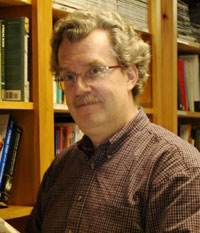 I have posted two articles (with more to come) that offer critical reflections on Jerry Coyne's article Seeing And Believing. In that article, Coyne deals most specifically with two "Darwinian churchgoers": Karl W. Giberson, and Kenneth R. Miller. The following two articles will be critical reflections from both Giberson and Miller themselves in response to Coyne.
I have posted two articles (with more to come) that offer critical reflections on Jerry Coyne's article Seeing And Believing. In that article, Coyne deals most specifically with two "Darwinian churchgoers": Karl W. Giberson, and Kenneth R. Miller. The following two articles will be critical reflections from both Giberson and Miller themselves in response to Coyne.I hope you enjoy!
"I enter this conversation feeling vaguely like a wishbone being stretched. On the one hand, I believe that the world is the creation of transcendent God that I perceive dimly behind the almost opaque curtain of my experience; but I also believe in the extraordinary power of science to unfold the nature of that world with astonishing clarity and conviction. I have one foot in each of Gould's non-overlapping magisteria and the space between them seems, at least in this conversation, uncomfortably large.
Discussions like this that juxtapose "empirical science" with "revealed religion" rarely seem like appropriately balanced encounters to me. When Ken Ham and his merry band of biblical literalists talk disparagingly about science, I can barely recognize it. But I had the same problem with Dawkins's send-up of believers in The God Delusion.
Coyne, who affirms Dawkins's approach, speaks of "theologians with a deistic bent" who inappropriately presume to "speak for all the faithful." The implication is that the "faithful" are the more authentically religious and the theologians are an aberration. This seems unfair to me. The great unwashed masses of these "faithful" should be juxtaposed with the great masses of people who "believe" in science but are not professionals. Most Americans -- and the rest of the world, for that matter -- are attached to both iPods and a belief that medical science is their best hope when they are sick. They "believe" in science. What do you suppose "science" would look like, were it defined by these "believers"? The physics would be Aristotelian; astrology and aliens would accepted as real; General Relativity would be unknown; quantum mechanics would be perceived as a way to influence the world with your mind. And yet all of these people would have had far more education in science than the typical religious believer has in theology. Science as "lived and practiced by real people" is quite different than the science promoted by the intellectuals in this conversation.
Empirical science does indeed trump revealed truth about the world as Galileo and Darwin showed only too clearly. But empirical science also trumps other empirical science. Einstein's dethronement of Newton was not the wholesale undermining of the scientific enterprise, even though it showed that science was clearly in error. It was, rather, a glorious and appropriately celebrated advance for science, albeit one not understood by most people. Why is this different than modern theology's near universal rejection of the tyrannical anthropomorphic deity of the Old Testament, so eloquently skewered by Dawkins? How is it that "science" is allowed to toss its historical baggage overboard when its best informed leaders decide to do so, even though the ideas continue to circulate on main street, but religion must forever be defined by the ancient baggage carried by its least informed?
The world disclosed by science is rich and marvelous, but most people think there is more to it. Our religious traditions embody our fitful and imperfect reflections on this mysterious and transcendent intuition -- an intuition that, as articulated by some of our most profound thinkers, seeks an understanding of the world that is goes beyond the empirical.
Coyne is correct that books like those he reviewed—Ken Miller's Only a Theory and my Saving Darwin—have not been particularly successful in securing a peaceful overlap for the magisteria, at least not for most people. Coyne would say there is no such peaceful overlap. But there are many well-informed believers who have come to peace with science, and who live happily on the rich, but thinly populated, turf where the magisteria overlap.
I think we can all agree though that, wherever we stand, there is a great need for a discussion of how America's conversation on origins should proceed. We need to wake up to the reality that current strategies have been an abysmal failure and ask some tough questions about why that is. There is a widespread fear on America's main streets that evolution is destroying a cherished belief in God. As a consequence, anti-evolution has assumed the proportions of a military-industrial complex but the battle is a proxy war, aimed not at evolution, but at materialism. I wonder what would happen if, in the name of pluralism and diplomacy, we could all agree that it was OK for people to believe that evolution was a part of God's plan. I suspect that cultural changes would be inaugurated that would eventually make both Eugenie Scott and Ken Ham irrelevant."
By way of richarddawkins.net
No comments:
Post a Comment